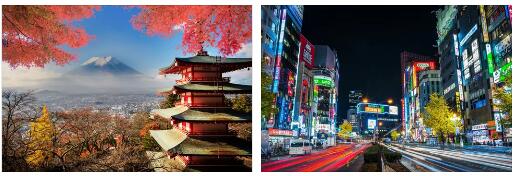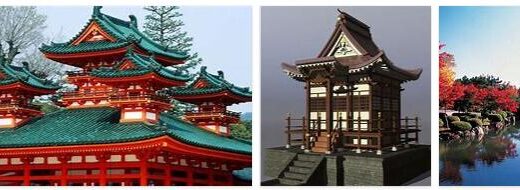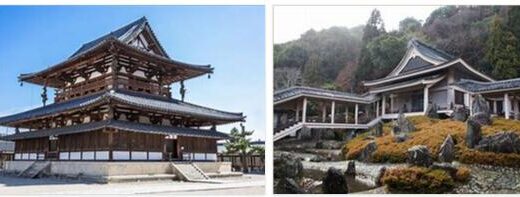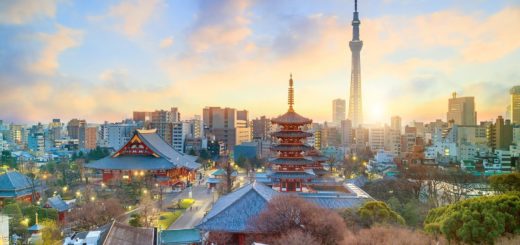Japan Country Overview
Japan is an archipelago located in an arc around the Sea of Japan in the very east of Asia and consisting of 3,000 large and small islands, including the 4 largest ones: Hokkaido, Honshu, Shikoku and Kyushu, with an area of 377 thousand km / w.
Being in the volcanic Pacific belt, the country is prone to volcanic eruptions and earthquakes, and throughout its territory there are hot natural water sources.
In a country surrounded on all sides by the sea, the picturesque indented coast creates many natural bays.
According to Dentistrymyth.com, Japan is divided into 8 regions: (starting from the north) Hokkaido, Tohoku, Kanto, Chubu, Kinki, Chugoku, Shikoku, Kyushu-Okinawa, and 47 administrative prefectures.
The climate of the country, stretched along the latitude by 25 *, varies greatly. In Hokkaido, in the north, the average temperature is below 10°C for more than half of the year and above 25°C for more than half of the year in Okinawa. Basically, the country is located in the temperate zone with favorable climatic conditions and is rich in greenery.
The main distinguishing feature of Japan is its ideology, which is based on the national religion – Shinto or the way of the gods. According to Shintoism, the world surrounding a person is filled with gods living everywhere: in a flower and in a tree, in a stone, in a waterfall and even in wells.
The love of rituals and the cult of contemplation, inherent in Shintoism, gave rise to a lot of beautiful Japanese customs and traditions: the tea ceremony, the creation of rock parks and symbolic landscapes, admiring nature and composing ikebana. In this regard, the capital of Japan rather contrasts with the eternal desire for peace and contemplation – the frantic rhythm of Tokyo with its needle-shaped skyscrapers, fast-moving traffic, and an inexhaustible flow of people has also become the hallmark of modern Japan. From the observation decks of the Tokyo TV tower, an amazing view of the multimillion-dollar metropolis opens up. From here you can also see the Landmark Tower – the tallest building in Japan, located in the neighboring city of Yokohama.
If you are interested in local exotic, be sure to go to the National Theater of Japan. Lovers of history, astronomy and other sciences are recommended to visit the Japan National Museum of Science. When you enter this museum, you will not be offered felt slippers, but will be given a special helmet and gloves connected by wires, and you will enter the world of virtual reality.
In the very center of Tokyo there is a picturesque park with the Imperial Palace. Emperor Akihito himself can be seen only twice a year – on December 23 (the emperor’s birthday) and on New Year’s Eve. Then ordinary Japanese are allowed to come to the palace and greet the father of the nation.
It should be noted that all the parks and gardens in Japan are beautiful, but the most attractive of them is the garden of the Reanji Temple in Kyoto.
The Japanese gardener sees his goal not in imposing his will on nature, but in emphasizing its natural beauty.
The Japanese chef seeks to bring out the natural taste of the product, avoiding the sophisticated ingenuity of the masters of Chinese and French cuisine.
The population of Japan is distinguished by exceptional national homogeneity, less than 1% of non-Japanese nationals live in the country – mostly Koreans.
The official language is Japanese, English is spoken only in the service and tourism sectors. Religion: Shinto, Buddhism, Christianity. The largest cities are Tokyo, Yokohama, Sapporo, Nagoya, Osaka.
The climate is monsoonal, temperate in the north, subtropical in the southern part of the Japanese islands, and tropical in most of the Ryukyu Islands. On the island of Hokkaido, in Sapporo, the average temperature in January is -5*С, in July +22*С, in Kagoshima it is respectively +6*С and +27*С, in Okinawa (Ryukyu Islands) +16*С and + 28*S. A significant warming effect on the climate of Japan is exerted by warm sea currents: the Kuroshio and the Tsushima Current. The Oyashio Current, on the contrary, cools the eastern coast of Hokkaido, and the monsoons contribute to the loss of a large amount of snow here in winter.
The time difference with Moscow is plus 6 hours in winter and plus 5 in summer.
The national currency of Japan is the Japanese yen. Bank of Japan notes currently in circulation are 1,000, 5,000 and 10,000 yen. In addition to banknotes in Japan, there are coins of 500, 100, 50, 10, 5 yen and a 1-yen coin. The yen exchange rate fluctuates between 120-130 yen per 1 dollar. Payment for goods and services is made exclusively in yen, in large stores, restaurants and hotels credit cards are accepted for payment.
Passport valid for at least 3 months from the end of the trip, detailed application form, two 3×4 photos. The visa is issued at the Japanese embassy within 25 days. A transit visa (for 72 hours) is issued at the airport upon arrival.
You can call abroad from a street pay phone with a sign International and Domestic Telephone (International and Domestic Telephone), the minimum charge is 100 yen. Some payphones work with prepaid calling cards. In addition, by dialing a code number, you can make international calls through your telephone company.
Interesting facts
Japan is a beautiful and interesting country with original culture, ancient history, rich traditions, polite and friendly people. However, in order to feel comfortable here, it is important, firstly, to strictly observe Japanese laws, and secondly, to be aware of your rights.
In accordance with Japanese law, foreigners in the country are required to carry their passports or local government-issued identification cards at all times. A foreigner’s lack of documents, evasion of timely registration, failure to report a change of residence, violation of the established periods of stay in the country, engaging in activities that go beyond the status of residence – all this is considered in Japan as a crime that provides for various penalties from a fine to imprisonment.
The main types of intracity transport are metro, bus and taxi. The fare on the metro and bus depends on the duration of the trip. The minimum fare on the subway is 110 yen, on the bus – 220 yen. Taxi in Japan is not the cheapest mode of transport, but it is the most comfortable: all cars are equipped with air conditioners, the air in them is deodorized, and the seats are covered with snow-white covers. You can rent a car, but keep in mind that the traffic in the country is left-hand drive, and the car will be right-hand drive, respectively. To travel from one city to another, the Japanese use a well-developed network of railways.
Tips
Japan currently ranks first in the world in terms of the number of restaurants per inhabitant. Japanese cuisine is not only a highly developed catering system, but also an important part of the Japanese way of life. In any Japanese city, you can find restaurants of various cuisines of the world: American, European, Chinese, Korean, Indian, Greek, Russian, where visitors are offered either a set of dishes or dishes to choose from.
In a Japanese restaurant, it is still customary to eat with chopsticks.
National Japanese cuisine is based on seafood, but even with a traditional list of purely Japanese dishes, each restaurant strives to find its own style, depending on the tastes of the cook and local customs. For example, crab restaurants are popular in Hokkaido, and sashimi made from poisonous fugu fish is popular in Osaka.
On a trip, it is better to take a Russian-Japanese phrasebook, as the Japanese speak English with a very specific accent.
Tipping is not customary in Japan.
Mains voltage -100 V, frequency – 50 or 60 Hz, depending on the territory.
Electrical sockets – two-pin, knife, differ from those used in Russia.
In huge 10-storey department stores, arcades, and shopping centers located near large hotels, you will find everything you can imagine. Japanese stores are first-class establishments known for their high level of customer service.
As a memento of visiting Japan, we recommend purchasing jewelry made from natural pearls, which are mined off the coast of Japan and are considered the best in the world.
The import of weapons, pornographic materials and drugs is strictly prohibited. Please note that some nasal inhalers may contain the substance deoxyephedrine, the use and possession of which is prohibited by Japanese law. Medicines containing this chemical compound should not be imported into Japan. The import of fresh fruits and vegetables, any plants and animals is also prohibited. Foreigners are allowed to import duty-free no more than 400 cigarettes or 100 cigars or 500 grams of tobacco; 3 bottles of alcoholic drinks; 50 milliliters of perfume; other goods worth no more than 200,000 yen.
Tips for visiting Japan
Japan is a beautiful and interesting country with original culture, ancient history, rich traditions, polite and friendly people. However, in order to feel comfortable here, it is important, firstly, to strictly observe Japanese laws, and secondly, to be aware of your rights.
In accordance with Japanese law, foreigners in the country are required to carry their passports or local government-issued identification cards at all times. A foreigner’s lack of documents, evasion of timely registration, failure to report a change of residence, violation of the established periods of stay in the country, engaging in activities that go beyond the status of residence – all this is considered in Japan as a crime that provides for various penalties from a fine to imprisonment.
While abroad, you should not give your passport to anyone. As long as the passport of a Russian citizen is in your hands, your interests are protected in the name of the Russian Federation.
While abroad, you should not give your passport to anyone. As long as the passport of a Russian citizen is in your hands, your interests are protected in the name of the Russian Federation.
People who speak Russian are a rarity in Japan. If you find yourself in an unpleasant situation, and there is no interpreter nearby, contact the nearest consulate of the Russian Federation. Remember your right to consular protection. The main task of the Consul of the Russian Federation is to protect the rights and interests of Russian individuals and legal entities. Call our consular offices at any time and for any, even if, in your opinion, not very significant issue. Always carry the phone numbers of Russian consular offices with you.
We wish you a pleasant time in Japan, get to know Japanese culture better, and establish friendly relations with the Japanese.



